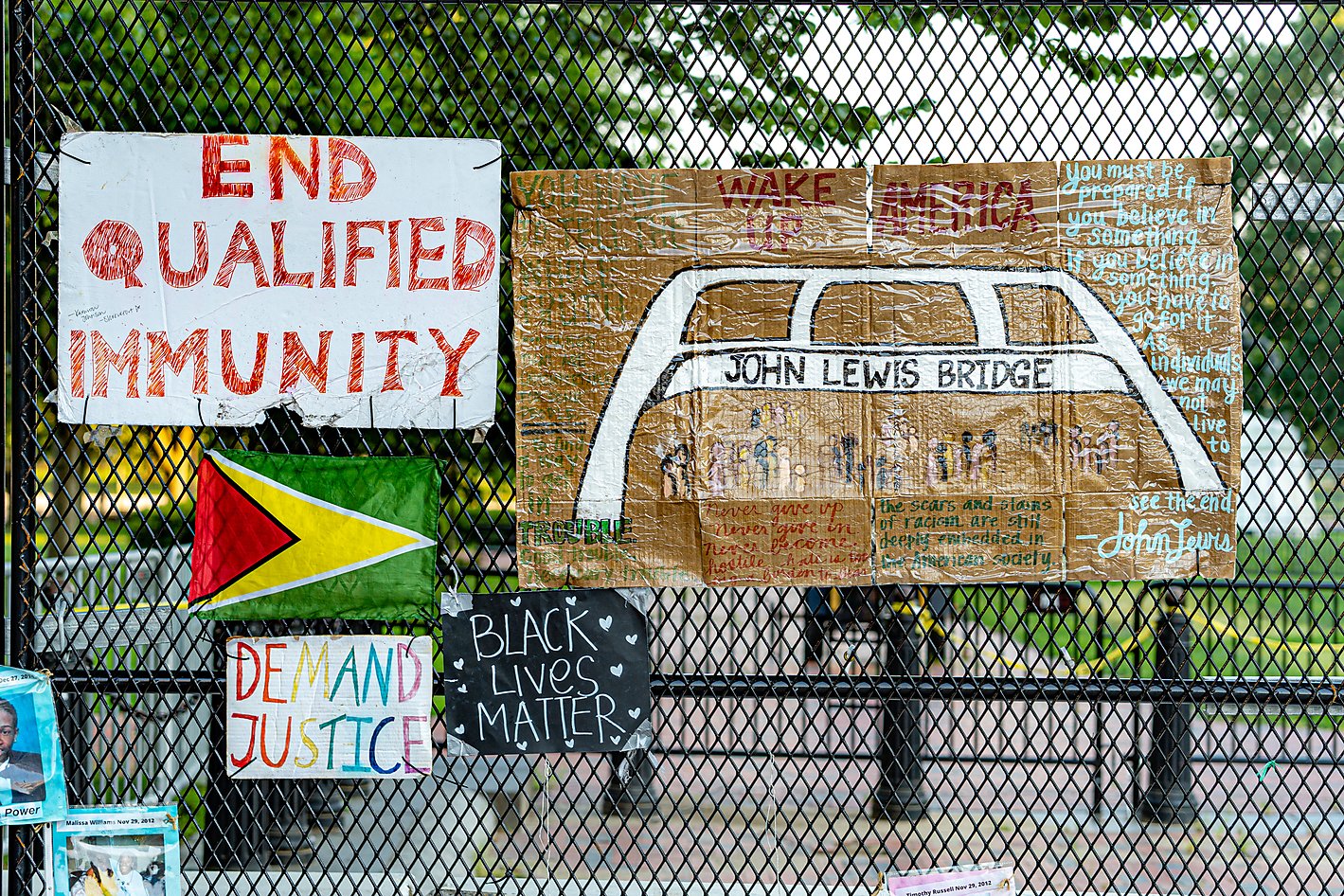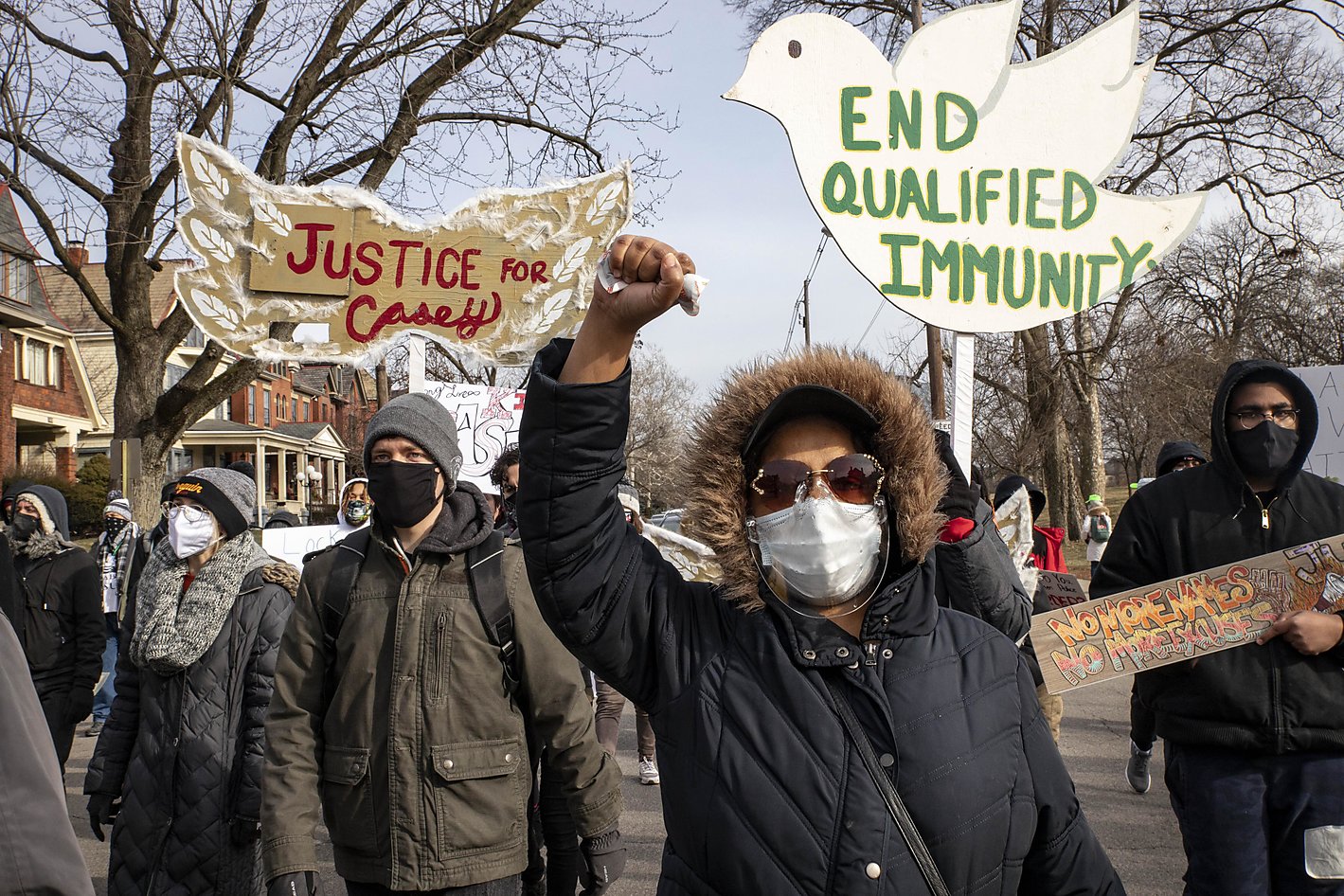There’s merit to the perception that most police misconduct comes from a handful of bad officers. In most police forces, less than 10 percent of officers are investigated for misconduct. But that means that those officers often have lengthy track records—Derek Chauvin, for instance, had 17 reports against him before he murdered George Floyd—and that police departments aren’t letting bad officers go. Instead, police departments regularly defend their worst offenders.
How Qualified Immunity Hurts Law Enforcement
Public confidence in policing has plummeted over the past decade. High-profile incidents of police violence have weighed heavily on police-community relations.
(scroll down to continue)
(scroll down to continue)
(scroll down to continue)
(scroll down to continue)
(scroll down to continue)
(scroll down to continue)
Policing is challenging and dangerous work that relies on the trust of the community to be effective.
But after reaching its peak in 2004, public confidence in police has been in decline.
Incidents of police violence have hurt the relationship between police and community.
And in 2020, public confidence in police fell below 50 percent for the first time.
A New York Times analysis found that the New York City Police Department (NYPD) had reduced or rejected severe discipline recommendations made in 71 percent of serious misconduct charges.
The analysis found that the NYPD regularly ignored the board’s recommendations, overruled them, or downgraded the punishments, even when police officials confirmed that the officers had violated department regulations. All the while, the city paid millions of dollars to resolve lawsuits from people filing complaints in some of those very same cases.

Invented by the Supreme Court in the late 1960s, qualified immunity is a judicial doctrine that shields state actors from liability from their misconduct, even when they break the law. The standard itself uses illogical rules that effectively prevent police officers from being sued for unconstitutional misconduct unless the plaintiff can identify a preexisting case with nearly identical facts. But since cases barred by qualified immunity are dismissed before trial, the precedent the doctrine demands is rarely set.
A Reuters study showed that courts have been increasingly willing to grant qualified immunity to police officers accused of using excessive force. In many cases, judges dismiss the case because they don’t believe officers used excessive force. But in a growing category of cases, the question of excessive force is immaterial: judges grant police immunity from suit under the arbitrary logic of qualified immunity.
Constitutional jurisprudence shields officers from “split‐second mistakes.” A police officer cannot be sued for excessive force, for instance, unless his actions were unreasonable given the specific circumstances in which force was applied.
But the doctrine of qualified immunity provides an out for a different class of officers: officers whose misconduct would be otherwise indefensible. That, in turn, provides a judicial blessing for departments to keep unethical officers on the force—leaving good cops in bad company.
The facts behind cases where qualified immunity is invoked are often alarming.
Warning: graphic video and audio content.
Officer: Tony. Tony! Tony! Time for school. Wake up.
Laughter
Officer (mocking): “I don’t want to go to school, Mom. Five more minutes, Mom.”
Laughter
Officer: First day! Can’t be late!
Officer: Tony. We bought you new shoes for the first day of school, c’mon.
Laughter
Officer: We made breakfast, scrambled eggs. Your favorite.
Officer: With waffles.
Officer: Waffles.
Officer: Rooty, tooty, fruity waffles.
Officer: I think he’s out cold now.
Officer: He is. This might wake him up.
Officer: I don’t know. He just got quiet.
Officer: All of a sudden, just whoop.
Officer: Wuh, there he comes.
Silence
Tony Timpa dialed 911, scared for his life. He was having a psychotic episode, he said, and was off his medications. The Dallas Police Department dispatched its crisis intervention team: five officers ostensibly equipped to help those with mental disabilities.
But these officers weren’t fit to respond to someone having a mental health crisis. After restraining Timpa’s legs and putting him in police cuffs, the officers laid him prone and kneeled on his body for 14 minutes, even after he passed out.
The officers ignored Timpa’s cries that they were killing him and mocked him as he died.
A trial court dismissed a lawsuit from Timpa’s family members on the basis of qualified immunity. An appellate court reversed that decision, but the officers appealed—leaving a final decision elusive more than five years after Timpa’s death. Four of the officers present at the scene of Timpa’s death remain on active duty, and the fifth retired at age 50.

Clarence Jamison was pulled over despite not committing a traffic violation.
His car registration checked out. But police officer Nick McClendon wouldn’t let Jamison go.
Jamison told the officer four times he couldn’t search his car, but McClendon kept asking until Jamison said yes. Jamison waited while McClendon tore up his car and summoned a K‑9 unit. It took nearly two hours for the police to let Jamison go.
But qualified immunity means the officer can’t be sued, despite clearly violating Jamison’s right to be free from illegal search and seizure.
What do our constitutional rights mean if they can’t be enforced?

Levi Frasier began recording as officers struck a suspect in the head six times. He was still recording as officers pulled a screaming woman to the ground. “Camera,” one of the officers said. The police followed Frasier back to his car.
“We can do this the easy way or the hard way,” an officer said, demanding Frasier hand over his tablet. Although Frasier initially refused, he feared he would be arrested if he didn’t comply.
When the officers returned his tablet, the video Frasier recorded was gone.
Did the officers intentionally violate Frasier’s First Amendment right to record police? No matter. Courts held the officers had “qualified” immunity from suit “even if the officers subjectively knew—based on their training or from municipal policies—that their conduct violated Mr. Frasier’s First Amendment rights.”

In recent years, incidents like these have brought qualified immunity to the forefront of the conversation surrounding police misconduct.

According to research from the Cato Institute and Pew Research Center, 63–66 percent of Americans now support repealing the doctrine so that citizens can sue police for wrongful misconduct.
Police appropriately have many protections to ensure they can do their job: huge numbers of cases against police are dismissed as frivolous, and the Fourth Amendment protects officers so long as their conduct was reasonable under the circumstance.
But qualified immunity is an arbitrary standard that goes beyond these protections—providing cover for bad officers.
“Qualified immunity protections have been applied in some extraordinary cases where the officer engaged in egregious behavior that the MCCA does not condone.”
“In order to improve public safety, we need to build trust in law enforcement, and in order to build trust, there must be transparency and accountability. As such, we believe it is crucial to end a legal doctrine that has contributed to the erosion of public trust in the justice system and made all of us less safe: qualified immunity.”
“Qualified immunity, a defense that shields officials from being sued, has been interpreted by courts so broadly that it allows officers to engage in unconstitutional acts with impunity.”
Thankfully, many local jurisdictions—including New York City, New Mexico, and Colorado—have passed bipartisan legislation to end qualified immunity. Their efforts will help police rebuild the trust and respect of their communities—because those communities will know that misconduct is no longer tolerated on the force.
Don’t let bad cops hide behind an arbitrary legal defense.






